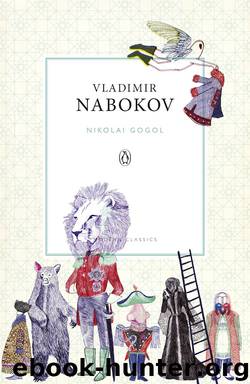Nikolai Gogol by Vladimir Nabokov

Author:Vladimir Nabokov [Nabokov, Vladimir]
Language: eng
Format: epub
ISBN: 9781846143311
Publisher: Penguin Books Ltd
Published: 2013-01-17T16:00:00+00:00
4
The difference between human vision and the image perceived by the faceted eye of an insect may be compared with the difference between a half-tone block made with the very finest screen and the corresponding picture as represented by the very coarse screening used in common newspaper pictorial reproduction. The same comparison holds good between the way Gogol saw things and the way average readers and average writers see things. Before his and Pushkin’s advent Russian literature was purblind. What form it perceived was an outline directed by reason: it did not see color for itself but merely used the hackneyed combinations of blind noun and dog-like adjective that Europe had inherited from the ancients. The sky was blue, the dawn red, the foliage green, the eyes of beauty black, the clouds grey, and so on. It was Gogol (and after him Lermontov and Tolstoy) who first saw yellow and violet at all. That the sky could be pale green at sunrise, or the snow a rich blue on a cloudless day, would have sounded like heretical nonsense to your so-called ‘classical’ writer, accustomed as he was to the rigid conventional color-schemes of the Eighteenth Century French school of literature. Thus the development of the art of description throughout the centuries may be profitably treated in terms of vision, the faceted eye becoming a unified and prodigiously complex organ and the dead dim ‘accepted colors’ (in the sense of ‘idées reçues’) yielding gradually their subtle shades and allowing new wonders of application. I doubt whether any writer, and certainly not in Russia, had ever noticed before, to give the most striking instance, the moving pattern of light and shade on the ground under trees or the tricks of color played by sunlight with leaves. The following description of Plushkin’s garden in Dead Souls shocked Russian readers in much the same way as Manet did the bewhiskered philistines of his day.
‘An extensive old garden which stretched behind the house and beyond the estate to lose itself in the fields, alone seemed, rank and rugged as it was, to lend a certain freshness to these extensive grounds and alone was completely picturesque in its vivid wildness. The united tops of trees that had grown wide in liberty spread above the skyline in masses of green clouds and irregular domes of tremulous leafage. The colossal white trunk of a birchtree deprived of its top, which had been broken off by some gale or thunderbolt, rose out of these dense green masses and disclosed its rotund smoothness in midair, like a well proportioned column of sparkling marble; the oblique, sharply pointed fracture in which, instead of a capital, it terminated above, showed black against its snowy whiteness like some kind of headpiece or a dark bird. Strands of hop, after strangling the bushes of elder, mountain ash and hazel below, had meandered all over the ridge of the fence whence they ran up at last to twist around that truncated birchtree halfway up its length.
Download
This site does not store any files on its server. We only index and link to content provided by other sites. Please contact the content providers to delete copyright contents if any and email us, we'll remove relevant links or contents immediately.
| African | Asian |
| Australian & Oceanian | Canadian |
| Caribbean & Latin American | European |
| Jewish | Middle Eastern |
| Russian | United States |
4 3 2 1: A Novel by Paul Auster(12362)
The handmaid's tale by Margaret Atwood(7749)
Giovanni's Room by James Baldwin(7315)
Asking the Right Questions: A Guide to Critical Thinking by M. Neil Browne & Stuart M. Keeley(5751)
Big Magic: Creative Living Beyond Fear by Elizabeth Gilbert(5743)
Ego Is the Enemy by Ryan Holiday(5406)
The Body: A Guide for Occupants by Bill Bryson(5072)
On Writing A Memoir of the Craft by Stephen King(4924)
Ken Follett - World without end by Ken Follett(4716)
Adulting by Kelly Williams Brown(4561)
Bluets by Maggie Nelson(4541)
Eat That Frog! by Brian Tracy(4509)
Guilty Pleasures by Laurell K Hamilton(4436)
The Poetry of Pablo Neruda by Pablo Neruda(4087)
Alive: The Story of the Andes Survivors by Piers Paul Read(4014)
White Noise - A Novel by Don DeLillo(3999)
Fingerprints of the Gods by Graham Hancock(3983)
The Book of Joy by Dalai Lama(3965)
The Bookshop by Penelope Fitzgerald(3839)
